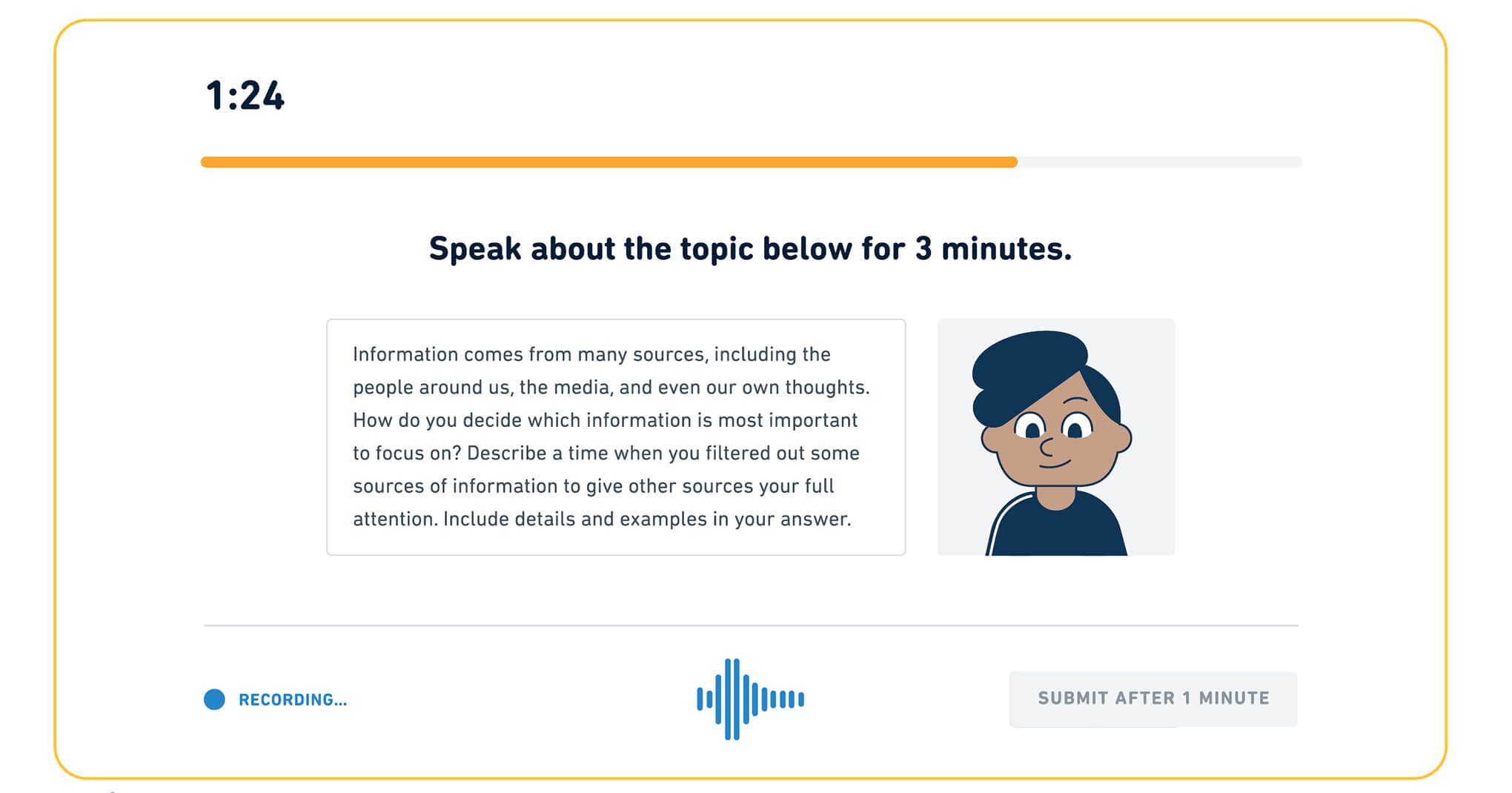Introduction
The Duolingo English Test (DET) is now recognized by institutions globally as a valid test of your English proficiency level, on the same level as legacy tests like the IELTS and TOEFL.
While the DET seems a bit easier, it can still be stressful, especially when you encounter the Speaking Sample question, where you must speak for at least 90 seconds to a random question.
But don’t worry…
By the end of this short article, you will know exactly how to speak and score high on test day.
Or…
If you just want to try some free practice, check out this free example here.


Over 100 Free DET Practice Questions
Here’s what you will learn:
Duolingo Speaking Sample - Everything You Need to Know
Speaking Sample questions are similar to Read, Then Speak. You will be given a written prompt and asked to speak about the topic for 1 to 3 minutes. This task tests your speaking skills, including pronunciation, fluency, and the ability to organize and express your thoughts clearly.
Details:
Preparation Time
You will have 30 seconds to prepare your response before speaking. Take your time to relax and organize your thoughts.
Question Frequency
Expect only one Speaking Sample question per test, usually towards the end of the exam
Speaking Time
You must speak for a minimum of 60 seconds and a maximum of 180 seconds. Aim for at least 90 seconds if you wish to earn a higher score.
Clear and Confident Speech
Speak in a loud, clear, and confident voice. Do not let poor recording quality interfere with earning a higher grade.
Similar to Read, Then Speak
Remember, the question format and approach is very similar to the Read, Then Speak question type
Check the example below:
- What was it?
- Who did you give it to?
- How did it make you feel?
- Why did you give this particular gift to this person?
Duolingo Speaking Sample - Quick Tips
-
Flexible Response:
Don't worry about following a strict templated response. Instead, focus on answering all of the questions in the prompt with sufficient detail. -
Speaking Time:
As mentioned before, speak for at least 90 seconds to demonstrate fluency and provide a well-developed response. -
Check the Questions:
Glance back at the questions in the prompt while speaking. Be sure to stay on topic and answer all the questions asked. -
Fluency Over Length:
While you should speak for a longer amount of time, it is more important to sound like a fluent English speaker. Avoid rushing or forcing yourself to speak if it impacts your delivery. -
Be Engaging:
Show your personality, smile, and speak with enthusiasm to sound natural and leave a positive impression on the audience.
Duolingo Speaking Sample - Question Types
Describe - Past Experience:
Share a personal experience related to the prompt
EXAMPLE: Describe a time you had a meal with someone in their own home. Whose house did you go to? What did they cook? Did you enjoy dinner? Would you go again?
Describe - General Topic:
Provide details and information about a general subject.
EXAMPLE: Talk about a custom in your country. What is it? When is it? Who participates? Where does it happen? Do you think others should learn about this custom?
Compare:
Highlight the similarities and differences between two or more things.
EXAMPLE: Compare doing homework alone and doing homework with a group of people. Is one way more effective than the other? Do you prefer one way over the other? Which one is easier? Which one is harder?
Opinion - General Topic:
Express your opinion on an issue and provide reasons and examples to support your viewpoint.
EXAMPLE: Imagine you have to give your best friend some bad news. Would you prefer to deliver the news in a quiet, private place or a noisy, public place? Why? Give specific reasons for your answer.
Duolingo Speaking Sample - How to Practice
Use DET Practice Questions:
Your first stop for reliable practice questions should be the official Duolingo English Test website. After that, a close second is TST Prep, in my humble opinion (haha).
Record and Analyze:
Practice speaking with a voice recorder and listen back to your responses. This is crucial. It will help you assess your fluency, pronunciation, and vocabulary.
Self-Grading Checklist:
Use a checklist based on the DET grading criteria to evaluate your performance (see the checklist below).
Grading Criteria
- Grammatical Accuracy: Use correct grammar and sentence structure throughout your response.
- Grammatical Complexity: Try to use a range of grammatical structures, in other words, do not keep everything in the simple present or simple past tense.
- Advanced Vocabulary: Try to use advanced vocabulary while sounding natural. For example, instead of saying “I think” you could say “I truly believe”. It might be strange and a bit too advanced if you said “In my esteemed estimation.” No one talks like that.
- Diverse Vocabulary: Avoid repeating the same words or phrases. Showcase a wide range of vocabulary. Including a personal example is an easy way to do that.
- Task Relevance: I can’t say it enough, answer ALL the questions. There are usually multiple questions within a single prompt.
- Pronunciation and Pace: Pronounce words clearly and naturally. Speak at a pace that is comfortable and easy to understand.
Self-Grading Checklist
If you are studying on your own, this checklist will help.
Record your voice, listen back, and use these questions to help you identify weaknesses and improve your fluency for test day.
- Did I speak for at least 90 seconds?
- Did my introduction restate the main idea of the question?
- Did I expand on my points with additional details or personal examples?
- Did I have enough time to include a short conclusion?
- Did I provide enough descriptive words and specific vocabulary?
- Did I answer all of the questions asked?
- Did I speak at a natural and conversational pace for the majority of my response?
- Did I have less than eight vocal fillers ("uh," "um")?
- What can I do next time to improve my score?
Additional Tips and Resources
- Be Yourself: Try to relax and speak naturally, as if you were talking with a friend on the phone.
- Remember Common Topics: The DET speaking and writing questions will often ask about travel, education, personal experience, and the impact of technology. Practice with some of these types of questions before test day.
- Speech to Text: Practice speaking and transcribing your response with sites like Otter. At TST Prep, most of our speaking sample questions include speech-to-text as well.


Over 100 Free DET Practice Questions
Conclusion
The Duolingo Speaking Sample questions are tough, but you can do it.
Now you know what type of Speaking Sample questions to expect on test day how to organize your response and how to use a self-grading checklist to help you improve the quality of your response.
Practice regularly and don’t be shy to record your voice. I know you hate the sound of your own voice. We all do! Get over it if you want to score high on test day.
Do you have any more tips for this question type? Share in the comments below and help us all improve 🙂









